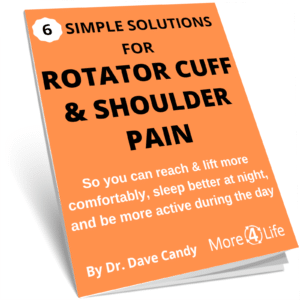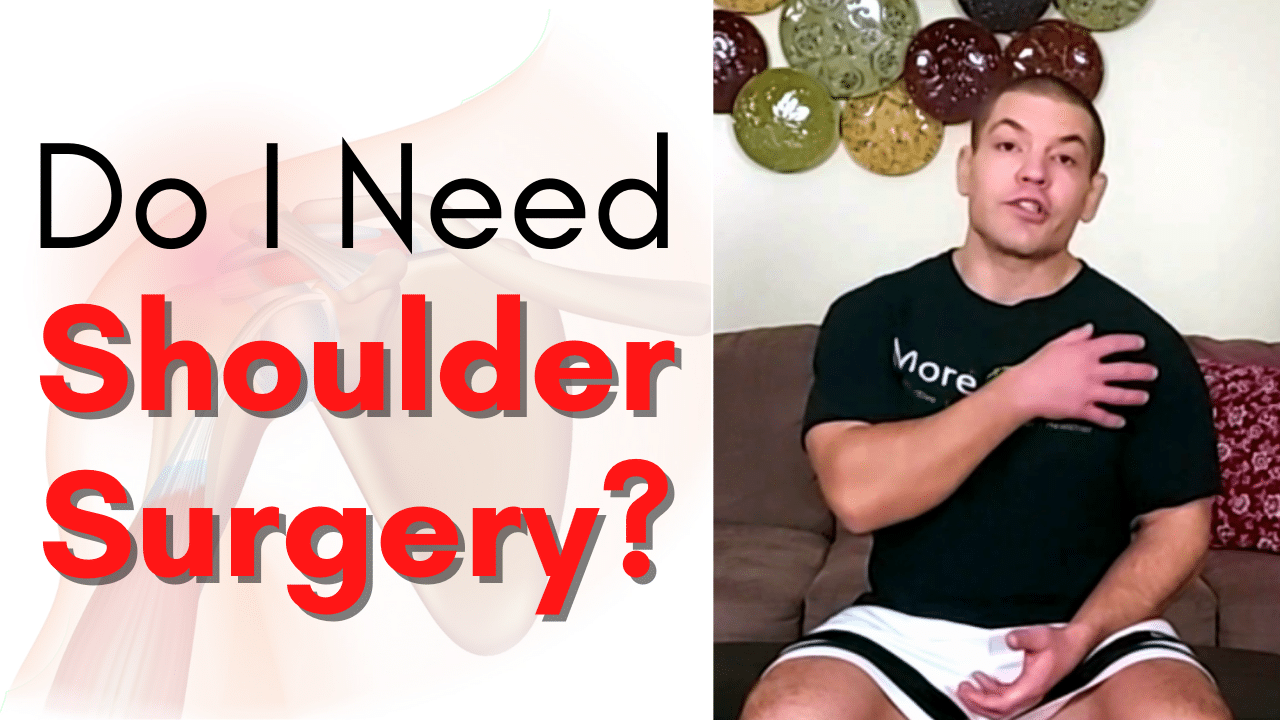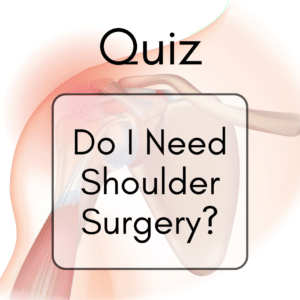Almost everyone with a rotator cuff tear has the same fear, whether spoken or unspoken. And that fear is:
Do I Need Shoulder Surgery?
Most people have heard at least one horror story of a rotator cuff surgery gone bad. And if you have a rotator cuff tear, you've probably at least once found yourself wondering "How do I know if I need shoulder surgery?"
Watch the video below to learn how to tell if you'll need shoulder surgery for your rotator cuff tear.
Take The "Do I Need Shoulder Surgery Quiz"
(Opens in Facebook Messenger)
What Percentage Of Rotator Cuff Tears Need Surgery?
Rotator cuff tears are fairly common. About 22% of the adult population has a rotator cuff tear according to a 2013 study.
However, that's not evenly distributed.
People less than 40 virtually don't have them at all. They increase to 10-15% in the 50s and 60s, and point then dramatically increase after the age of 70. Different studies estimate that 30-80% of people over the age of 70 have at least a partial rotator cuff tear.
However, the funny thing is that almost 2/3rd of the people who DID have rotator cuff tears DID NOT have pain.
And even a smaller number needed surgery.
With 331.9 million people in the US, 22% of that means there are 73 million people with rotator cuff tears.
By comparison, there are only about half a million rotator cuff surgeries performed each year.
That means only about 0.6% of people with rotator cuff tears actually end up having surgery each year.
Now that still doesn't answer the question of what percentage of people need surgery.
There are people that probably need surgery, but can't have it because of other medical complications.
Additionally, there are people who don't need shoulder surgery who end up having surgery.
You don't want to be one of those people.
So How Do You Know If You Need Shoulder Surgery For A Rotator Cuff Tear?
Statistically speaking, you probably don't according to the numbers above.
You have a much better chance of NOT needing shoulder surgery than you have of needing surgery.
Let's define "needing" shoulder surgery.
You need food.
You need water.
You need shelter.
You need a cardiac bypass surgery if you're having a heart attack.
If you don't have these things, you'll die.
No one really NEEDS shoulder surgery though.
It's an elective surgery.
You won't die from shoulder pain (unless it's caused by a heart attack).
However, you CAN die from shoulder surgery. You most likely won't, but it's possible.
So you have to weigh the risks and benefits to decide if you really want shoulder surgery.
No one really wants shoulder surgery.
They want the things that they perceive come from shoulder surgery.
Those things might include:
- Decreased shoulder pain
- Improved shoulder range of motion
- Being able to do their household chores
- Returning to a manual labor job
- Sleeping better at night
- Lifting their grandchildren
- Playing sports such as golf, swimming, volleyball, tennis, or pickleball
However, there's no guarantee that you'll achieve all of these things by having a rotator cuff surgery.
What If You Could Get These Things Without Shoulder Surgery?
Would you be interested?
Tap the button below to discover how our specialists can help your shoulder pain.
Shoulder Surgery Is An Ugly Beast
Many people don't realize just how involved a rotator cuff surgery is.
Here are a few frequently asked questions that you should know when deciding if you need shoulder surgery:
How long is the recovery process after a rotator cuff surgery?
Overall, people usually recover most of their function in about 5-6 months after rotator cuff surgery. However, it can take a year or more to fully recover.
In general, you'll wear a sling for about 6 weeks after the surgery and have minimal to no use of your arm during that period.
During that time, you may start doing some gentle passive range of motion of your arm. That means either a physical therapist moves your arm, or you use your other arm to move the surgical arm.
Then you'll gradually progress to active motions of your arm and around 3 month after surgery, you'll start doing strengthening exercises for your rotator cuff.
How long will I have pain after shoulder surgery?
That's highly variable. Some people feel better after just a week or two.
For other people it takes months or years.
And some people never get rid of their pain completely.
In fact, sometimes shoulder surgery can make your shoulder pain worse.
(I tend to think that these people probably weren't the greatest surgical candidates in the first place, which I'll get to a bit later).
How much is shoulder surgery?
Shoulder surgery can cost anywhere from $5000 to $25,000 or more depending on the geographical region, the surgeon, the hospital or surgical facility, and the exact surgical procedure.
And as mentioned above, there's no guarantee that it will work.
So that begs the question...
Are there alternatives to shoulder surgery?
There are alternatives to shoulder surgery. Largely those are corticosteroid injections and physical therapy.
If you'd like to find out if our specialist physical therapists can help you avoid surgery, you can request an appointment. Or if you're just looking for information right now, you can download a free copy of our Rotator Cuff & Shoulder Pain Guide below.

Do I Need Shoulder Surgery For My Rotator Cuff Tear?
If by "need" you mean do you need surgery to get rid of your shoulder pain and get back to the activities that you enjoy, there are certain people who are better surgical candidates than others.
I've discussed this in depth in my post "Will a rotator cuff tear heal on it's own without surgery?"
However, here are the highlights:
Who actually needs surgery for a rotator cuff tear and who doesn't?
The indications for a rotator cuff surgery include:
- younger than 60 years with a full-thickness rotator tear
- a failed bout of physical therapy lasting at least 3 months
- having symptoms for more than 1 year
- significant shoulder weakness and/or disability.
So if you don’t meet all or most of the criteria above, your chance of needing rotator cuff surgery is low.
Additionally, you want to rule out any factors that would cause you to have a poor outcome after shoulder surgery.
Some of these things include:
Your shoulder pain is being referred from your neck.
If you've got a pinched nerve in your neck it can present as shoulder pain. The C4 and C5 nerves innervate your shoulder and rotator cuff muscles. Having a rotator cuff surgery won't fix your pain if the problem is in your neck.
You have uncontrolled diabetes.
Diabetics have a higher likelihood of developing a frozen shoulder in general, and then if you add immobilization after surgery to the mix, you're asking for trouble.
You're not willing to immobilize your shoulder for 6 weeks.
If you're not going to adhere to wearing your shoulder sling virtually 100% of the time for 6 weeks after surgery, don't even bother. You'll likely re-tear your rotator cuff.
You're not willing to do at least 4 months of physical therapy.
People who have had a successful rotator cuff repair will tell you that you need to do the therapy in order to get the best result.
People who have had an unsuccessful rotator cuff repair will often admit that "I didn't do my therapy".
Rotator cuff surgery isn't a quick fix. It's a last resort and there's a long recovery process even after you have it.
Want To Relieve Your Shoulder Pain Without Surgery?
Tap the button below to request an appointment with one of our specialists.




